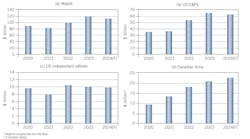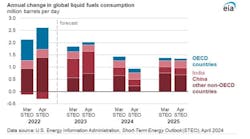Sam Fletcher
OGJ Senior Writer
HOUSTON, Jan. 31 -- US equities prices fell Jan. 28, but energy commodities soared as growing civil unrest in Egypt put Wall Street in a panic.
The US equities market was down a second consecutive week, with all of the weekly losses concentrated in the Jan. 28 session. “The setback is not insignificant as it makes now three consecutive weeks where the Standard & Poor’s 500 Index has not been able to confirm a break of the resistance at 1,300,” said Olivier Jakob at Petromatrix in Zug, Switzerland.
Although investors and consumers suffered losses in other sectors, Jakob said, “The sector that held the most during the week was the energy sector.” He said, “The S&P remains over-dependent on the energy sector, which itself remains highly correlated to oil prices.”
As part of its second phase of “quantitative easing” to stimulate the economy, the US Federal Reserve did a $8.4 billion permanent open market operation (POMO) on Jan. 28 “and the US gross domestic product number was positive, but that did not prevent the S&P from suffering its worse day since the start of QE2 as the focus turned to the riots in Egypt,” Jakob said.
Despite a Western tendency to consider recent riots in Tunisia and Egypt as “North Africa fighting for more democracy,” Jakob said, “In our opinion one underlying common problem is commodity inflation. The riots…really started this year in La Paz, Bolivia, and are unlikely to end in Cairo. The last time we had some widespread riots across the globe was in the first half of 2008, and our index of main consumer commodities is now higher than in the summer of 2008 and 17% higher than at the peaks of 2008 when measured on a euro basis.”
He acknowledged, “There is of course a political dimension to the protests of Tunisia and Egypt, but lack of jobs and high commodity prices are a recurrent theme and a fuel to the fire.”
Suez Canal
Egypt is “of major importance to the international oil market as a key transit point for oil shipments out of the Persian Gulf, via the Suez Canal and the Sumed (Suez-Mediterranean) Pipeline,” said James Zhang at Standard New York Securities Inc., the Standard Bank Group. “Closure of the Suez Canal and the Sumed Pipeline would divert tankers around the southern tip of Africa, the Cape of Good Hope, adding approximately 6,000 miles, or about 15 days, to transit time.”
According to the Suez Canal Authority and US Department of Energy, 585,000 b/d of crude passed through the canal in 2009, most of it from the Persian Gulf. Oil flow through the Sumed pipeline that year was around 1.1 million b/d.
“The amount of oil transported in 2009 by both the Suez Canal and the Sumed Pipeline was about 50% lower from the levels in 2008,” said Zhang. “This however reflects the changing dynamics of the international crude oil markets, where Asian demand is increasing at a higher rate than European and American markets, while West African crude production is meeting a larger share of the latter’s demand.”
He noted, “The Suez Canal has previously been closed on three occasions: the Second World War saw it closed to non-Allied shipping; the Suez Crisis between late 1956 and early 1957; and the Arab-Israeli wars of 1967 and 1975.” Nevertheless, he said, “We see a low probability that the Suez Canal and Sumed Pipeline operation will be affected by the ongoing political turmoil in Egypt in the near term. The role of these two key oil transportation routes is still critical, but less so due to the change of dynamics in the international oil market. However, there are contagious risks [for] main oil-producer countries like Algeria and Libya.”
On the other hand, analysts at Barclays Capital Oil Services and Drilling Equity Research said, “The current unrest in Egypt may have implications for the oil service and drilling industry given the large number [29] of offshore rigs in the area and the land drilling activity underway.” They said, “If the unrest spreads to other countries in North Africa, the oil service industry would be more severely impacted as many companies are active in Libya and Algeria.”
Other Barclays Capital analysts reported, “Although the industrial city of Suez has witnessed some of the worst violence during the past week, there have been no reported attempts to target ships. Even if Western companies become a major target for the protestors, we believe that shipping traffic through the Canal is unlikely to be seriously imperiled, though some individual ships docked in port might be at risk of attack if the situation deteriorates further. Even in the unlikely event that the there is an attempt by some groups to disrupt shipping traffic, it would not necessarily be easy to accomplish.”
Energy prices
Most energy commodities increased across the board Jan. 28, more than wiping out losses from the previous session. The March contract for benchmark US light, sweet crudes shot up $3.70 to $89.34/bbl on the New York Mercantile Exchange. The April contract escalated $3.39 to $91.68/bbl. On the US spot market, West Texas Intermediate at Cushing, Okla., was up $3.79 to $89.43/bbl. Heating oil for February delivery gained 3.56¢ to $2.69/gal on NYMEX. Reformulated blend stock for oxygenate blending for the same month climbed 7.52¢ to $2.46/gal.
The new front-month March contract for natural gas inched up 0.4¢ to $4.32/MMbtu on NYMEX. On the US spot market, however, gas at Henry Hub, La., lost 7.4¢ to $4.32¢/MMbtu.
In London, the March IPE contract for North Sea Brent came within pennies of the $100/bbl price it has been pursuing, closing at $99.42/bbl, up $2.03 for the day. Gas oil for February gained $7.25 to $824.24/tonne.
The average price for the Organization of Petroleum Exporting Countries’ basket of 12 benchmark crudes was up 68¢ to $94.10/bbl. So far this year, it has averaged $92.69/bbl.
Contact Sam Fletcher at [email protected].

